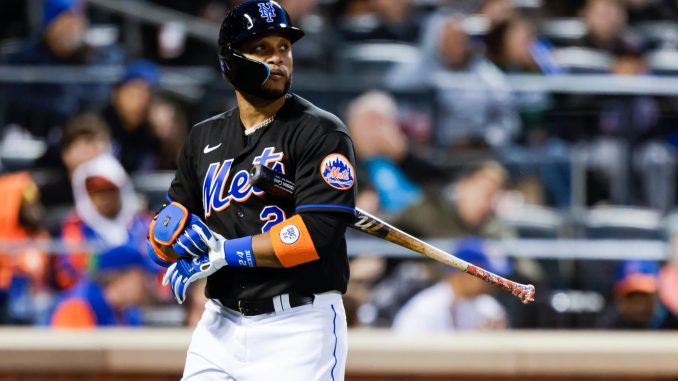
By John Schilling
When Mets owner Steve Cohen bought and took over the team from Fred Wilpon, Jeff Wilpon, and Saul Katz in late 2020, the hedge fund billionaire didn’t waste any time cutting off the fat that had weighed the Mets down season after season. Upon taking the reins, Cohen fired then general manager Brodie Van Wagenen, a player agent the Wilpons had hired in 2018. This past offseason, the Mets parted ways with Luis Rojas, another Wilpon hire who managed the team for two seasons.
On May 2, the Mets severed one of the remaining links to the Wilpon era in second baseman Robinson Cano, who was designated for assignment by the team and will be officially released, if not claimed off waivers by another team, in the coming days. The news came after speculation that the team might instead option third baseman J.D. Davis, first baseman Dominic Smith, or infielder Luis Guillorme to Triple-A Syracuse or cut fourth outfielder Travis Jankowski.
Cano joined the Mets shortly after Van Wagenen took control in 2018 and made a massive trade that would haunt the Mets in the immediate aftermath. The Mets received Cano and closer Edwin Diaz from the Seattle Mariners for first baseman Jay Bruce, reliever Anthony Swarzak, pitching prospects Justin Dunn and Gerson Bautista, and perhaps the most controversial inclusion: outfield prospect Jarred Kelenic.
With an aging Cano coming off of an 80-game suspension for performance-enhancing drugs and a relatively unproven closer in Diaz, the trade made very little sense, especially at the cost of prospects. Cano had also signed a massive contract with Seattle, requiring the Mets to pay the 36-year-old $63 million over the next five years. Still, Van Wagenen defended the move.
“This trade should be a signal to our players and to our fans that words alone will not define this franchise,” said Van Wagenen in a press conference. “The New York Mets and ownership group … we have a winning mindset and collectively we believe everything is possible and nothing is impossible.”
While optimistic, Van Wagenen’s two losing seasons that followed made clear he was in over his head, and his dealings were shady to say the least. Cano had been a client of Van Wagenen prior to his job switch in 2018, and Van Wagenen kept this trend up by signing another former client in Jed Lowrie to a multi-year deal, which ended with him only playing nine games total. If you smell a conflict of interest, you are on point, and it was moves like these that ultimately got Van Wagenen fired in 2020 and the Wilpons were notoriously known for.
Not to mention, upon joining the Mets, Cano struggled, batting his worst season average to date. Things began to look up in 2020, however, when Cano, despite spending some time on the injured list, hit for one of the best triple slashes in his career with .316/.352./.544 and an OPS of .896, the second best in his career. Then, Cano reverted back to his old ways.
Prior to the 2021 season, Cano was suspended a second time for PEDs, resulting in a full-season suspension without pay. When Cano returned in 2022, he was quick to apologize for his actions and detailed the sadness he felt during his year away.
“Sometimes I cried,” Cano told the New York Post earlier this year. “Every day, I sit down and watch the game. It’s hard to watch on TV and know that you have the talent and ability to be out there. Not only performance but being a leader in the clubhouse.”
Despite his blunders, Cano’s leadership in the clubhouse as a veteran could not be understated and was something the Mets lacked during his absence. As the MLB rosters routinely shrunk to 26 players, however, the Mets had to decide: Could Cano’s leadership, along with the $36 million still owed to him, justify his horrendous .165 batting average? The notoriously cheap Wilpons may have thought so, but Cohen was clear about what needed to happen.
“He said ‘Make the baseball decision,’” said general manager Billy Eppler. “Steve is very committed to winning…it’s do what’s best for the team and for the roster […].”
While cutting ties with Cano was the right move, his departure has left a sense of sadness in the Mets clubhouse, especially with shortstop Francisco Lindor.
“I didn’t want to see him go, but I respect the team’s decision,” Lindor told the New York Post. “He’s a great guy, great teammate. I wish I [could] spend more time with him, continue to learn about the game and different things that he has been through in life.”
As far as Van Wagenen, who is Cano’s agent once again, is concerned, the soon to be 40-year-old second baseman has nothing but respect for the Mets organization, and MLB hasn’t seen the last of him just yet.
“Robbie absolutely still wants to play. Given the right situation, he can still make a meaningful contribution for a team,” Van Wagenen told Joel Sherman of the New York Post. “Robbie is a true professional with a great deal of respect for the organization. He understands they had a tough decision to make. He wishes them well going forward.”
Cano’s career may have come to an end in Queens, but it seems Van Wagenen’s denialist hogwash will persist.
